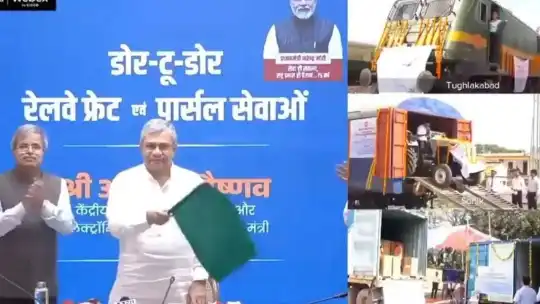Union Minister for Railways, Information & Broadcasting, and Electronics & IT, Ashwini Vaishnaw, virtually inaugurated the Sonik Integrated Logistics Hub in Uttar Pradesh and launched two new door-to-door freight and parcel services aimed at enhancing logistics efficiency across India. The new model allows industries to ship smaller consignments without having to fill an entire rake, bridging the gap between factories and railway loading points. Indian Railways now offers end-to-end logistics solutions, including first- and last-mile connectivity.

The Sonik hub, situated about 50 km from Lucknow and 20 km from Kanpur, is the first integrated logistics facility of its kind, developed under the Gati Shakti Cargo Terminals initiative to meet the growing freight demands of the Kanpur–Lucknow region. The facility includes warehousing, container stuffing and de-stuffing points, and amenities for both customers and workers. Operations at the terminal will be managed by the Container Corporation of India (CONCOR), ensuring smooth transport of fertilizers, cement, food grains, and tractors.
Vaishnaw highlighted that over 115 Gati Shakti cargo terminals have been developed nationwide to promote multimodal transport. The Mumbai–Kolkata corridor will be the first to operate under this system, with other major routes following.
The Assured Transit Container Train Service, connecting Delhi, Agra, Kanpur, and Kolkata, guarantees delivery within 120 hours and operates twice a week. Customers can choose from door-to-door, door-to-terminal, or terminal-to-door options through the CONCOR e-Logistics mobile app. The Door-to-Door Parcel Service on the Mumbai-Kolkata route offers a 7.5% cost reduction and nearly 30% faster transit compared to road transport. First-mile pickup and last-mile delivery are handled by CONCOR business associates, while Indian Railways’ parcel trains cover the middle-mile. This service already supports brands such as Castrol India, VIP Industries, Godrej & Boyce, and Nestle.
A 5,400-cubic-foot storage facility at both the Mumbai and Kolkata hubs further supports operations. Officials noted that the service will also be available to retail consumers, signaling a shift from Indian Railways’ traditional bulk freight model to smaller, containerized parcel movement.
